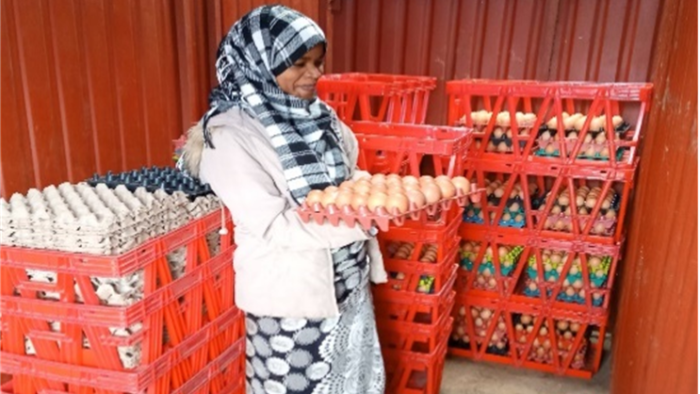From Coop to Market: The story of the Salayat Egg Collection Center
Poultry production is one of the most important and integral parts of rural household livelihoods in Ethiopia’s South Nations, Nationalities, and Peoples’ Region (SNNPR) region. Women, children, and youth are directly engaged in poultry rearing, egg collection, and grading and selecting quality chickens, as well as product marketing. This income generating activity – mostly managed and practiced by women and children at a small-scale – helps families meet immediate basic needs (like purchasing iodized salts and cooking oil, paying for school materials, and others) and contributes to poverty reduction. Additionally, poultry production contributes to improved health outcomes providing a source of protein and other nutrients.
Salayat is a mother, community member, and entrepreneur in her rural community in the Mierab Azernet district. In the spirit of entrepreneurship, Salayat began raising three egg-laying chickens in her home to provide for her children and family. After some time selling her egg products and experiencing a growth in revenue, Salayat decided to scale-up her operation.

Photo credit: Solomon Sermisa, Youth Specialist, SNNPR region.
In Silite zone, where a majority of community members from Mierab Azernet shop, egg producers market their products through informal channels across rural, pre-urban, and urban communities. This creates inconsistent market conditions for producers and an imbalance between demand and supply in markets across SNNPR, resulting in a volume of egg production that varies by level of husbandry practice and technology used.
Banyan Global is a subcontractor on the Feed the Future Ethiopia Value Chain Activity (VCA) responsible for gender and youth integration work to help ensure equitable project outcomes. With this in mind, Banyan Global worked with VCA to proactively engage women in the poultry sector through a number of organizations including cooperatives, businesses, and social groups.
In 2020, Salayat, along with two other women in her community, established the Salayat Egg Collection Center in Silite zone, with support from the local Ministry of Livestock and Fisheries office, the Youth Network for Sustainable Development, and the Office for Rural Job Opportunity Creation Strategy.
Banyan Global provided technical support to Salayat and her team as well as other actors across the poultry value chain, providing business skills training to strengthen the operation of women-led businesses. Through identifying and mobilizing women poultry growers to take ownership of their businesses, the women’s group is dedicated to filling the supply and demand gaps in their area and supporting an egg collection center that improves overall poultry sector production. The center has also had wider reaching benefits, providing income generation outlets for women and creating job opportunities for other members of the village community.
Since its inception, the Salayat Egg Collection Center has collected and marketed approximately 31,000 eggs and has earned a total revenue of approximately 217,000 ETB (4,626 USD). Salayat and her partners often collect eggs from youth associations that are active in rearing egg-laying chickens and sometimes collect eggs from the community as well, averaging 1,000 eggs/week. The growth of Salayat Egg Collection Center and its success within the district demonstrates that the egg market is a reliable source of employment for community members and is also a vital income generating opportunity for women in rural Ethiopia. According to Salayat,
“Technical and egg collection material support from VCA helped the egg center members to share household expenses and not expect their husband to provide financial support. This enabled them to feed their family with quality eggs, flourish in poultry production, and generate more income. Now we have been linked to different local partners, such as the cafe, hotels, and other local market outlets.”
